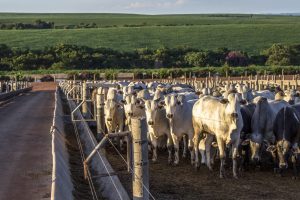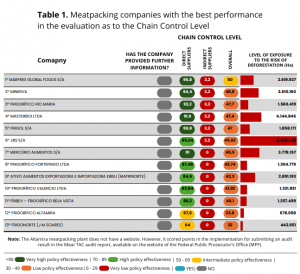According to the Green Radar report, in 2024, out of the 146 companies assessed, 6 were classified as having a very high level of control (dark green, 90-100 points) for direct suppliers. But the challenge with indirect suppliers persists for all of them.

The meatpackers Marfrig, Minerva and Rio Maria lead the Green Radar ranking in 2024, with the best results in controlling suppliers to prevent deforestation in the Amazon. These three companies were followed by Masterboi, Frigol, JBS, Mercúrio Alimentos, Fortefrigo, Mafrinorte, Valencio, Fribev, Frigorífico Altamira and Frigonorte. The annual report mapped out 146 beef companies with State Inspection Service (SIE) and Federal Inspection Service (SIF) registrations operating in the Legal Amazon, ranking their performance on their commitment to monitoring and controlling supplier farms.
Among those evaluated, some stood out in terms of their control of direct suppliers. Six meatpackers were classified as having a very high degree of control (dark green, 90-100 points), 5 had a high degree of control (light green, 70-89 points) and another 2 achieved an intermediate degree of control (yellow, 50-69 points). The challenge of tracing indirect cattle farms – where the cattle spend most of their lives – remains. No company has proven the complete traceability of these properties.
“From birth to fattening, a steer passes through several ranches. If the meatpacker only controls the fattening plant, it is very likely that it will contribute to deforestation in the Amazon, where deforestation has been more concentrated on breeding and rearing farms – which are the indirect suppliers of the meatpackers. Without the control of indirect ranches, no company can confirm that it is free from deforestation,” explains Paulo Barreto, senior researcher at the Institute of Man and the Environment of the Amazon (Imazon), one of the organizations that carries out this annual survey, in partnership with the Institute O Mundo Que Queremos (The World We Want).
According to the Brazilian Institute of Geography and Statistics (IBGE), the Legal Amazon concentrates 43% of Brazil’s cattle herd and the destruction of the forest in the region is directly related to the expansion of pastures, which covers around 90% of the deforested areas. “Some meatpackers are starting to carry out voluntary checks on indirect suppliers, but it’s difficult to assess the effectiveness of the scope of these initiatives due to the lack of independent proof such as an audit,” says Barreto.
Chain Control Level
This year’s Green Radar report shows a slow evolution in the sector. For the first time, Plena Alimentos voluntarily participated in the survey by sending in their answers to the questionnaire – the other companies continued to be evaluated through the public information they make available on their websites. In 2023, 38 meatpacking companies had websites, but many did not provide data on cattle control to assess the Chain Control Level. In 2024, this number grew to 41, but the amount of relevant information still remains negligible.
Five meatpacking plants showed a slight improvement in their results compared to the previous year: Plena Alimentos, Frigobom, Pantanal, Santa Cruz and Boa Carne. In addition, one meatpacker, Frigonorte (J M SOARES), was downgraded from red to orange due to the presence of an audit result in the “Beef TAC” report. The level of policy implementation, which corresponds to independent audits, has also increased. In 2023, 11 meat companies had independent audit results to attest to part of their supplier control claims. In 2024, this number rose to 13.
Degree of Exposure to the Risk of Deforestation
The Green Radar also assesses the Degree of Exposure to the Risk of Deforestation, which measures the area with deforestation risk factors in the companies’ potential cattle-buying zones. These factors include recent deforestation, areas embargoed for illegal deforestation and the risk of deforestation in the short term. According to the new report, the five meatpacking plants with the highest Deforestation Risk Exposure Level are, in this order: JBS, Frigo Manaus, Frialto, Masterboi and Amazon Boi. JBS is the company most exposed to the risk, with around 11.5 million hectares – an area larger than the state of Santa Catarina. This high exposure, which is twice that of the runner-up, is directly related to the scale of the company’s operations in the region: out of the 24 meatpacking plants that JBS owns in the Amazon, 21 are in operation. Most of the other companies in the sector have only one plant in the region.
“The Green Radar is a strategic tool for various purposes, as it can guide investors, banks, corporate buyers and importers, allowing them to identify risks and prioritize actions to promote more sustainable chains”, says Alexandre Mansur, project director of the O Mundo Que Queremos (The World We Want) Institute. “It is also an important tool for the sector itself, as it helps it to understand its current state and direct improvements, thereby securing greater safety, quality and competitiveness for Brazilian livestock farming,” he adds.
See below the ranking of the companies with the best performance in the assessment of the Chain Control Level:

To access the full report, click here.
The Green Radar
Radar Verde (Green Radar) is a joint initiative of the Amazon Institute for Man and the Environment (Imazon) and the O Mundo Que Queremos (The World We Want) Institute which, since 2022, has published surveys that classify meatpacking plants in the Amazon and the country’s main supermarkets according to the control and transparency of their meat chain. It is a public and independent indicator of transparency and control of the beef production and marketing chain in Brazil, which seeks to give visibility to companies committed to reducing deforestation in the Legal Amazon, contributing to environmental preservation and building a more transparent and efficient market.
